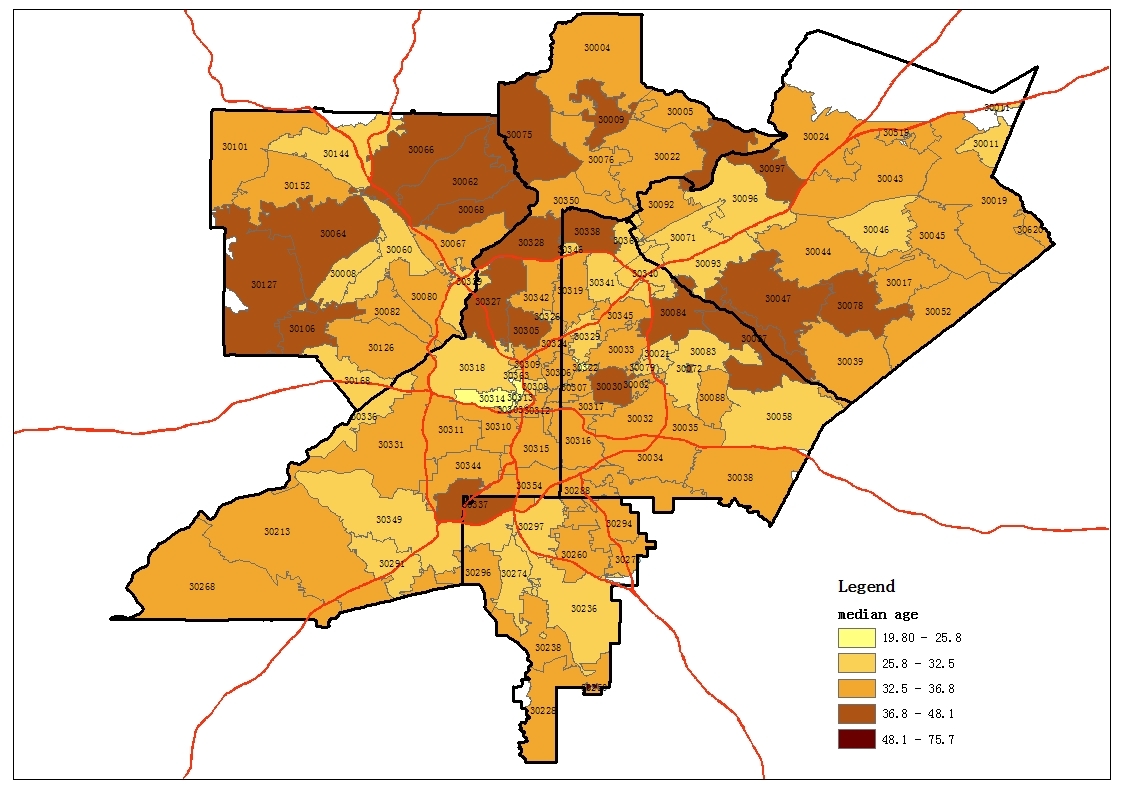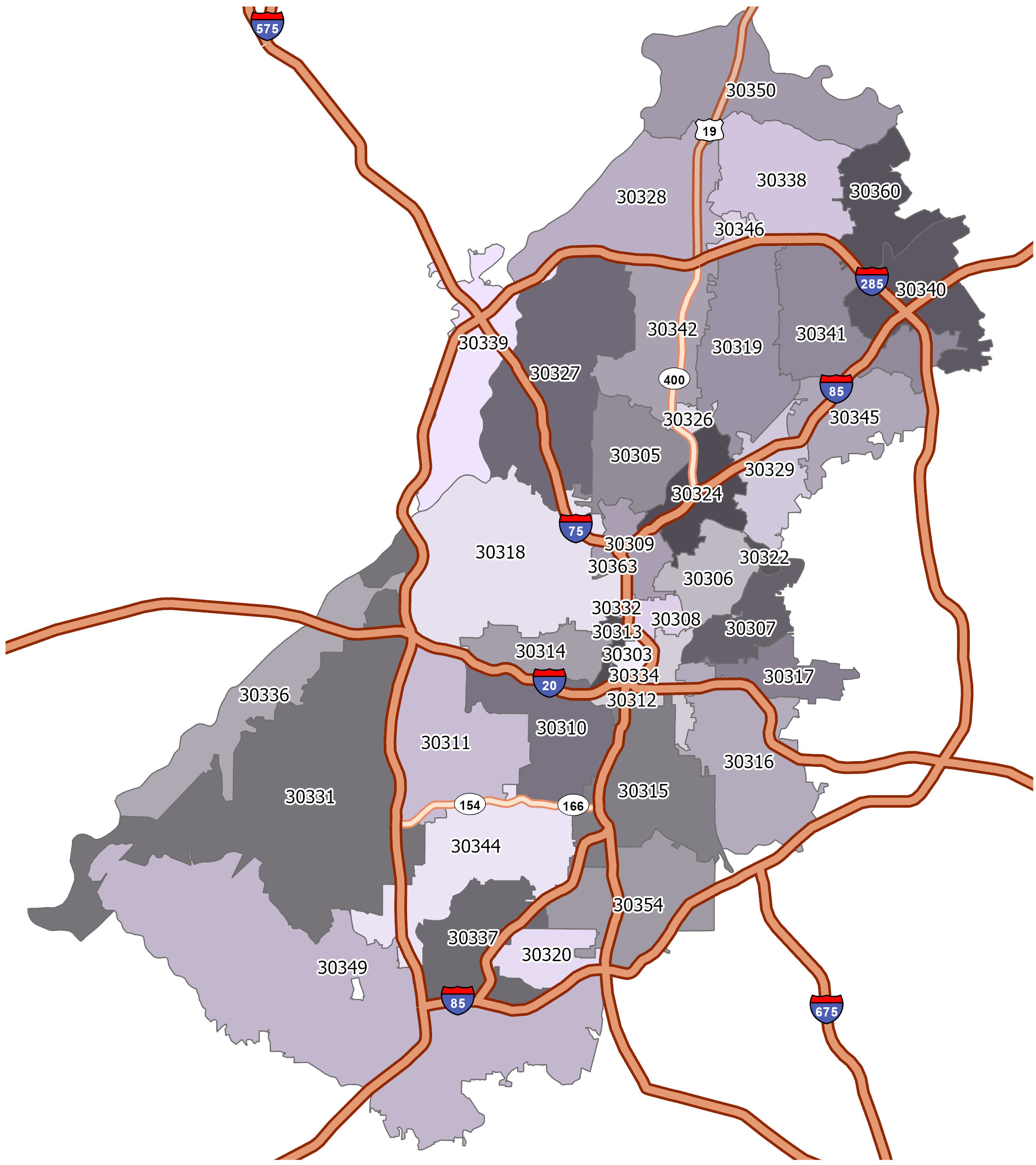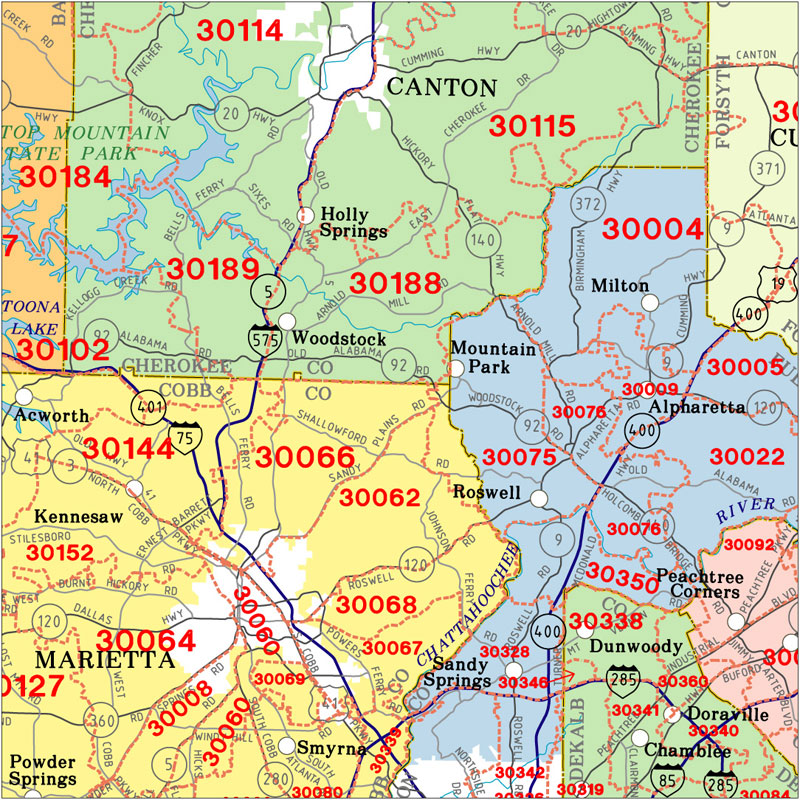Navigating the Atlanta Metro: A Comprehensive Guide to Zip Codes
Related Articles: Navigating the Atlanta Metro: A Comprehensive Guide to Zip Codes
Introduction
In this auspicious occasion, we are delighted to delve into the intriguing topic related to Navigating the Atlanta Metro: A Comprehensive Guide to Zip Codes. Let’s weave interesting information and offer fresh perspectives to the readers.
Table of Content
Navigating the Atlanta Metro: A Comprehensive Guide to Zip Codes

The Atlanta metropolitan area, a sprawling hub of commerce, culture, and innovation, is home to a diverse population spread across numerous neighborhoods and municipalities. Understanding the intricate network of zip codes within this vast region is crucial for a variety of purposes, ranging from navigating local services to conducting business operations.
This article aims to provide a comprehensive overview of the Atlanta metro zip code map, highlighting its importance and benefits while offering practical insights for navigating the city’s intricate geography.
A Glimpse into the Atlanta Metro Zip Code Landscape
The Atlanta metro area encompasses a wide range of zip codes, each representing a specific geographical area within the broader metropolitan region. These zip codes serve as essential identifiers for various purposes, including:
- Mail Delivery: The primary function of zip codes is to ensure efficient and accurate delivery of mail and packages.
- Emergency Services: First responders utilize zip codes to quickly locate addresses during emergencies, facilitating timely and effective response.
- Data Analysis: Researchers and data analysts rely on zip codes to segment populations, analyze demographic trends, and conduct market research.
- Business Operations: Companies use zip codes to target specific customer segments, optimize logistics, and manage delivery networks.
- Community Engagement: Local organizations and community initiatives often leverage zip codes to identify and connect with residents within specific neighborhoods.
Key Zip Code Areas and Their Significance
Downtown Atlanta (30303, 30308, 30313, 30318): The heart of the city, this area is home to major corporations, government offices, and cultural institutions. It is a vibrant hub for business, entertainment, and tourism.
Midtown Atlanta (30309, 30316): Known for its trendy restaurants, nightlife, and art scene, Midtown is a popular destination for young professionals and artists.
Buckhead (30305, 30326, 30327): An upscale neighborhood with luxurious shopping, dining, and residential areas, Buckhead is a symbol of affluence and high-end living.
Sandy Springs (30328, 30342): A suburban area with a mix of residential neighborhoods, office parks, and retail centers, Sandy Springs offers a more tranquil setting while remaining conveniently close to the city.
Roswell (30075, 30076): A historic city with a charming downtown area, Roswell offers a blend of small-town charm and modern amenities.
Alpharetta (30004, 30005, 30009): A thriving suburb known for its business-friendly environment, Alpharetta is home to a diverse range of industries and offers a high quality of life.
Decatur (30030, 30032): A vibrant city with a strong arts and culture scene, Decatur offers a unique blend of urban amenities and suburban tranquility.
Marietta (30060, 30062, 30067): A historic city with a rich military heritage, Marietta boasts a thriving downtown area and a diverse residential landscape.
Dunwoody (30338): A suburban area with a strong focus on education and community, Dunwoody offers a mix of residential neighborhoods, parks, and commercial centers.
Exploring the Benefits of Understanding Zip Codes
Understanding the nuances of Atlanta’s zip code map provides numerous benefits for individuals, businesses, and organizations alike:
- Targeted Marketing: By leveraging zip code data, businesses can target specific customer segments within the Atlanta metro area, maximizing the effectiveness of their marketing campaigns.
- Efficient Logistics: Companies can optimize their delivery networks and logistics operations by understanding the geographical distribution of their customer base and the associated zip codes.
- Community Engagement: Local organizations and community initiatives can utilize zip codes to identify and connect with residents within specific neighborhoods, fostering stronger community ties and promoting local engagement.
- Informed Decision Making: Individuals and businesses can make more informed decisions about housing, transportation, and business operations by understanding the characteristics and amenities associated with different zip code areas.
- Enhanced Safety and Security: By understanding the zip code map, individuals can be more aware of their surroundings and potential risks, promoting personal safety and security.
FAQs Regarding Atlanta Metro Zip Codes
Q: What are the most affluent zip codes in the Atlanta metro area?
A: Some of the most affluent zip codes in the Atlanta metro area include 30305, 30326, 30327 (Buckhead), 30342 (Sandy Springs), and 30067 (Marietta).
Q: What are the most diverse zip codes in the Atlanta metro area?
A: Atlanta is a highly diverse city, and many zip codes reflect this diversity. Some examples include 30318 (Downtown), 30309 (Midtown), and 30316 (Midtown).
Q: What are the safest zip codes in the Atlanta metro area?
A: Crime rates vary across the Atlanta metro area. Some zip codes considered relatively safe include 30328 (Sandy Springs), 30075 (Roswell), and 30004 (Alpharetta). However, it is essential to research specific areas and consider personal safety precautions.
Q: How can I find the zip code for a specific address in the Atlanta metro area?
A: There are several online tools and resources available for finding zip codes based on addresses, including the United States Postal Service website (usps.com) and various mapping services.
Tips for Navigating the Atlanta Metro Zip Code Map
- Utilize online resources: Explore websites like usps.com, Google Maps, and other mapping services to search for specific zip codes and explore the geographical distribution of different areas.
- Consult local guides and publications: Local publications, such as city magazines and neighborhood newspapers, often provide detailed information about specific zip codes and their characteristics.
- Engage with local communities: Connect with residents and businesses in specific zip codes to gain insights into the local culture, amenities, and lifestyle.
- Consider your personal needs and priorities: Determine your priorities in terms of housing, transportation, education, and lifestyle, and select zip codes that align with your preferences.
Conclusion
The Atlanta metro zip code map serves as a valuable tool for understanding the city’s complex geography and its diverse population. By leveraging this knowledge, individuals, businesses, and organizations can navigate the region more effectively, make informed decisions, and engage with local communities. Whether seeking a new home, exploring business opportunities, or simply navigating the city’s vibrant landscape, understanding the nuances of Atlanta’s zip code map is a key step towards a more fulfilling and enriching experience.

/cdn.vox-cdn.com/uploads/chorus_image/image/58372635/Screen_Shot_2018_01_18_at_1.59.48_PM.0.png)



![Atlanta GA Zip Code Map [Updated 2022]](https://www.usmapguide.com/wp-content/uploads/2019/03/printable-atlanta-zip-code-map-1-768x994.jpg)
Closure
Thus, we hope this article has provided valuable insights into Navigating the Atlanta Metro: A Comprehensive Guide to Zip Codes. We appreciate your attention to our article. See you in our next article!
